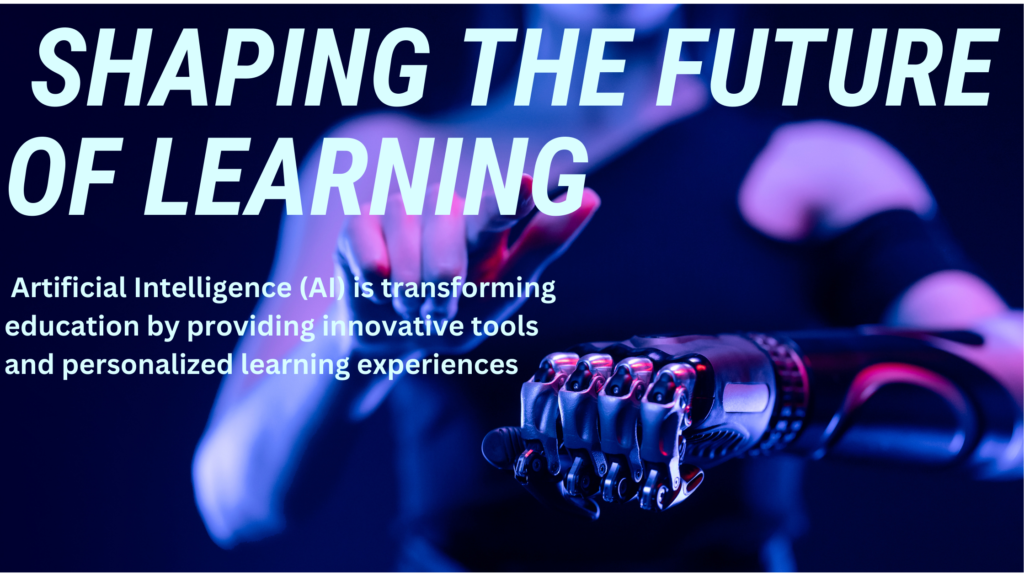AI in Education: Shaping the Future of Learning
Introduction to AI in Education
Artificial Intelligence (AI) is transforming education by providing innovative tools and personalized learning experiences. The integration of AI in education promises to enhance teaching methodologies, improve student outcomes, and make learning more accessible to everyone.

Personalized Learning Paths
AI-driven platforms create personalized learning paths tailored to individual student needs. By analyzing student data, AI can identify strengths and weaknesses, offering customized content that ensures effective learning for each student.
Real-Time Feedback and Assessment
AI provides real-time feedback on assignments and assessments, helping students understand their mistakes and improve continuously. This immediate feedback loop fosters a deeper understanding of the subject matter and enhances learning outcomes.
Enhancing Accessibility in Education
AI makes education more accessible, especially for students with disabilities or those in remote areas. AI-powered tools, such as speech-to-text and text-to-speech converters, assist students with different learning needs, ensuring inclusive education.
Virtual Classrooms and Distance Learning
AI supports virtual classrooms and distance learning by providing interactive and engaging online platforms. Students can access quality education from anywhere in the world, breaking down geographical barriers and promoting lifelong learning.
Intelligent Tutoring Systems
AI-powered intelligent tutoring systems offer personalized assistance to students, mimicking the guidance of a human tutor. These systems adapt to each student’s learning pace and style, providing targeted help to ensure mastery of subjects.
Automating Administrative Tasks
AI automates administrative tasks such as grading, scheduling, and record-keeping, freeing up educators to focus more on teaching and student engagement. This improves the overall efficiency of educational institutions.
Enhancing Teacher Support
AI provides teachers with valuable insights into student performance and engagement. By analyzing data, AI can suggest personalized teaching strategies and interventions, helping teachers address individual student needs effectively.
Reducing Dropout Rates
AI can identify at-risk students early and provide the necessary support to prevent dropouts. By analyzing patterns in student behavior and performance, AI offers interventions that keep students on track and engaged in their studies.
Facilitating Lifelong Learning
AI promotes lifelong learning by offering flexible and personalized learning opportunities. Online courses and learning platforms powered by AI cater to adult learners, helping them acquire new skills and stay competitive in the job market.
Improving Student Engagement
AI-driven tools make learning more interactive and engaging for students. Gamified learning experiences, interactive simulations, and AI-powered educational games foster a love for learning and improve retention.
Supporting Multilingual Education
AI offers translation and language learning tools that support multilingual education. Students can learn new languages or receive instruction in their native language, enhancing their understanding and proficiency.
Enhancing Research Capabilities
AI aids in educational research by analyzing large datasets and generating insights. Researchers can explore new educational methodologies, track trends, and develop innovative teaching strategies more efficiently.
Predicting Student Performance
AI can predict student performance and suggest interventions to improve outcomes. By analyzing historical data, AI identifies patterns and provides actionable insights to help educators support their students better.
Enhancing Collaboration in Education
AI facilitates collaboration between students and teachers through intelligent communication tools. Virtual classrooms, discussion forums, and collaborative projects powered by AI foster a sense of community and enhance learning experiences.
Conclusion
AI is reshaping the educational landscape by offering personalized learning experiences, improving accessibility, and enhancing teacher support. As AI continues to evolve, its impact on education will only grow, making it a crucial component of the future of learning.



